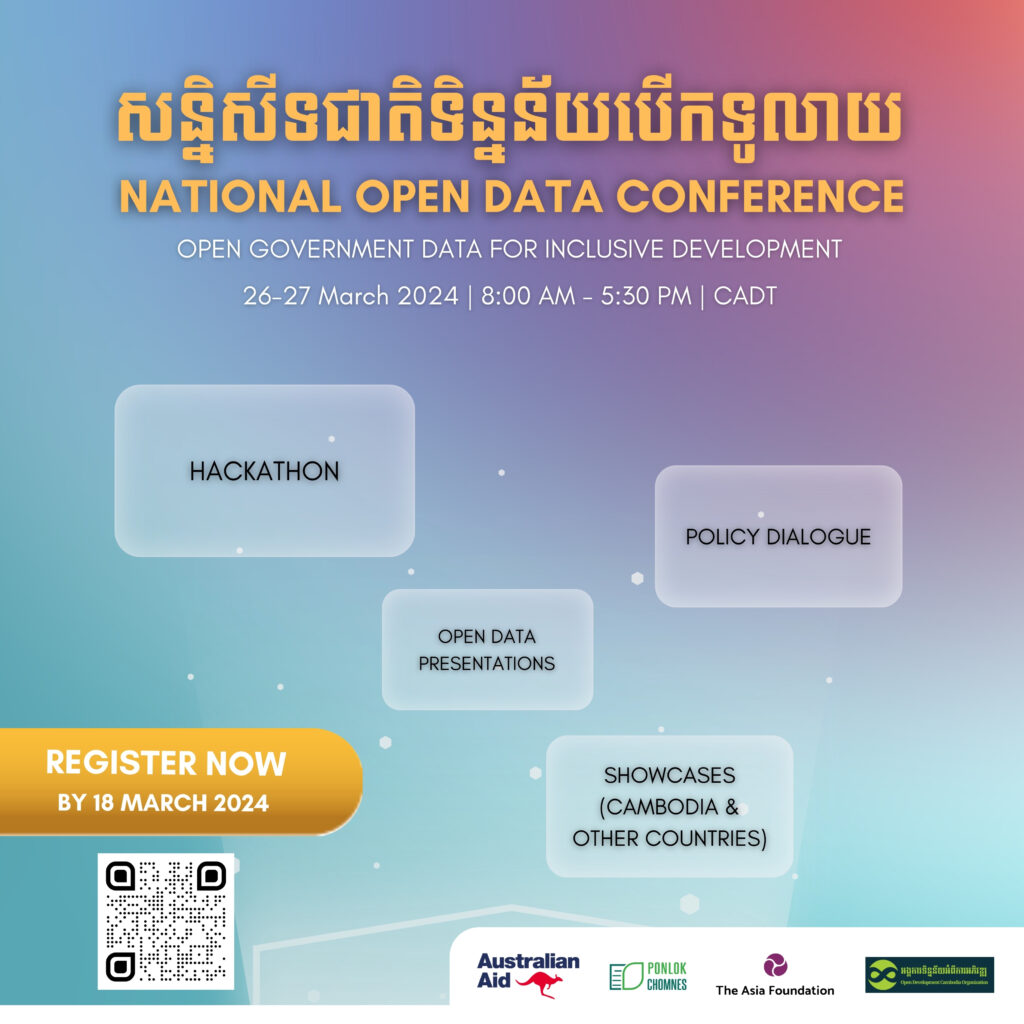
Background
According to the Cambodia Digital Economy and Society Policy Framework 2021–2035, data plays an increasingly important role in Cambodian public governance for several reasons. Commitment to the reforms (and continued economic growth) is expected to make Cambodia a middle-income nation by 2030 and a high-income country by 2050.
The process of digital government administration begins with the formulation and adoption of necessary policies and the creation and updating of relevant legislative frameworks and regulations by the Royal Government of Cambodia (RGC). It continues with the development of digital government standards and architecture through principles, norms, models, technological evolution, and national and international best practices. These are the foundations for establishing digital government effectively, efficiently, and securely to support the construction and growth of a robust and dynamic digital economy and society.
The Open Data Policy is one of several that the government is working on and gathering input for. In accordance with existing laws and regulations, the new Open Data Policy would define principles, standards, licenses, and procedures for opening, storing, and sharing government data with public institutions, the business sector, and individuals. The ultimate objective of open data is to increase transparency, fairness, and accountability, as well as the quality of services, hence increasing public trust in government and promoting research and innovation with sustainability and inclusion [1].
Open data will permit non-state actors to participate, offer comments, and hold the government responsible, in addition to aiding in the promotion of openness inside the government. However, non-state actors in Cambodia have only achieved sluggish advancements [2] in terms of data access and data usage for policy objectives [3].
To accomplish our shared goal of bridging the gap between government and non-state actors on open data dialogue, the Open Development Cambodia Organization (ODC), in partnership with The Asia Foundation, will host a two-day National Open Data Conference in Cambodia from March 26 to 27. In addition to promoting national and regional collaboration and open data efforts, we expect that the open and inclusive involvement in this event will increase public knowledge of open data and awareness of the challenges facing Cambodia’s open data adoption. The outputs from the group discussion during this two-day event will be an additional complement to the government’s efforts to develop a meaningful and effective open data policy.
This National Open Data Conference 2024 is funded by the Australian Department of Foreign Affairs and Trade through The Asia Foundation’s Ponlok Chomnes: Data and Dialogue for Development in Cambodia Program.
Purposes
- To increase public awareness of the progress and obstacles to open data adoption in Cambodia and the region,
- To gather inputs and suggestions to contribute to the draft open data policy and data governance legislation,
- To encourage data transparency and accountability initiatives in diverse sectors,
- To strengthen the open data network in Cambodia and the region.
Participants
The National Open Data Conference will gather at least 75 participants from a variety of backgrounds, including international and local NGOs, the private sector, researchers and policymakers, indigenous youth groups, people with disabilities, women, and LGBTQI+.
Organizers
Open Development Cambodia Organization (ODC) is the leading open data platform in Cambodia, which makes up-to-date and reliable data and information on socioeconomic and environmental issues publicly available as a “one-stop shop”. ODC promotes the use of accurate data for evidence-based and transparent decision-making processes towards the sustainable development of the country. For the past ten years, ODC has actively worked to enhance the amount of public data, raise public awareness, and build the capacity of relevant stakeholders. ODC uses its expertise in data and ICT, mapping and GIS, digital security, and research to compile, analyze, and disseminate information in user-friendly and accessible digital formats. Material available on ODC’s online platform includes datasets, information topic pages, interactive maps, news, and legal documents, among others. ODC does not promote any particular perspective, agenda, or bias other than to provide objective information about Cambodia and its development.
The Asia Foundation is implementing the Ponlok Chomnes: Data and Dialogue for Development in Cambodia Program between July 2023 and June 2027 with support from the Australian Department of Foreign Affairs and Trade. The goal of Ponlok Chomnes II is that public policy decisions, based on evidence and informed by inclusive dialogue, are operationalised and become the norm in Cambodia.
Other Events
NEP Cambodia: Third National Conference on Transforming Education to Promote Inclusion in the Education Sector
The NEP Third National Conference aims to address the knowledge gap regarding policyimplementation and local targets of SDG4 and TES Commitments and will bring together civil society, development partners, and government actors, to discuss how all education sector stakeholders can participate in transforming education, systems strengthening, and education sector collaboration in the Cambodian context. Registration: https://questionpro.com/t/AVgOrZzEfA Full program in PDF: Download
The Asia Pacific Internet Governance Academy 2025 (APIGA)
APIGA aims to develop youth leaders’ understanding of the Internet and its ecosystem. It also aims to equip participants with the knowledge and skills to participate in Internet policy making through developing a strong foundation in the following: The concept of Internet governance, and the multistakeholder model of policymaking; Current global Internet governance issues, and applying these issues at the local and regional levels; The confidence to speak up in regional and international fora.
Internet Governance Forum 2023
The 18th annual meeting of the Internet Governance Forum will be hosted by the Government of Japan in Kyoto from 8 to 12 October 2023. The Forum\'s overarching theme is: The Internet We Want - Empowering All People.